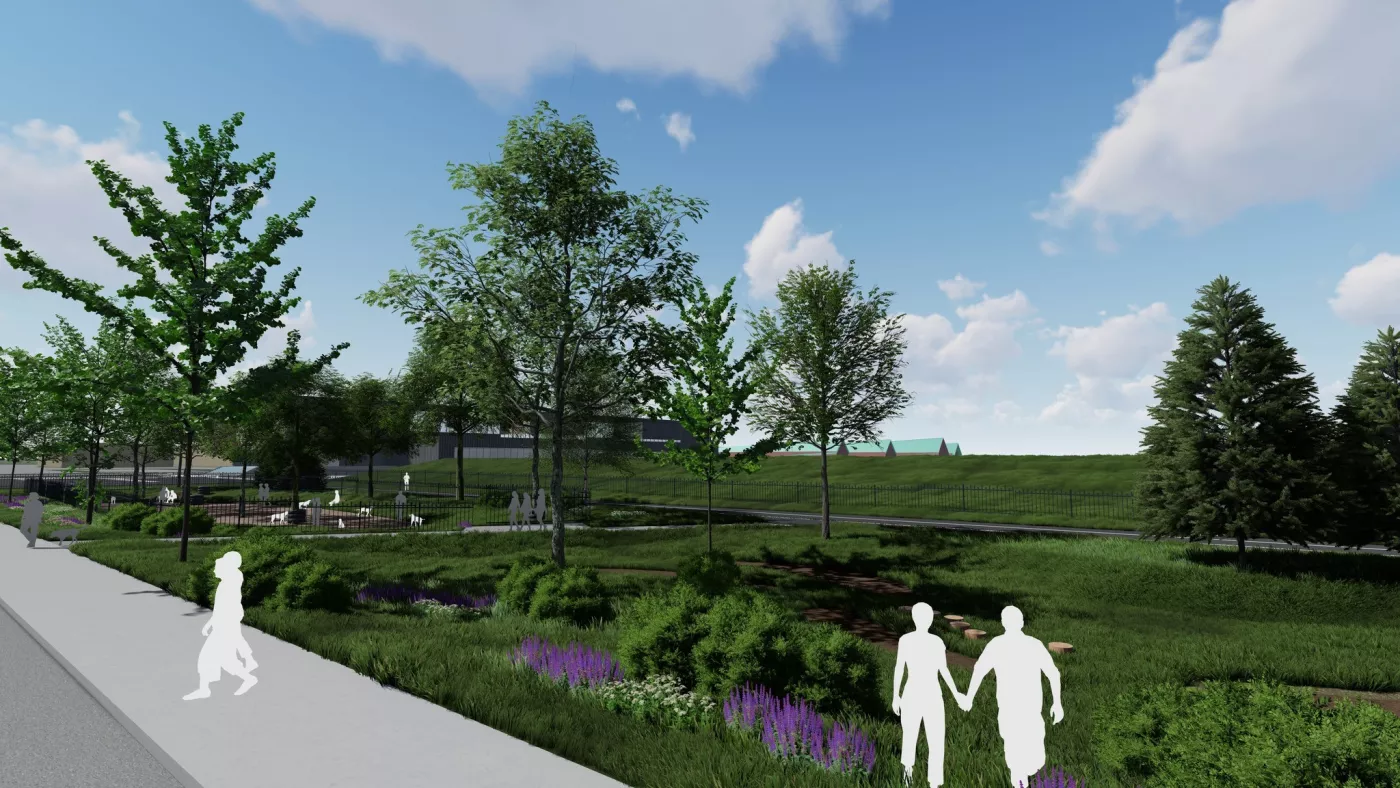The Ville de Montréal is proud to announce that a new sponge park, the largest to date on its territory, will be built in the borough of Verdun.
The park, which will be built near Joseph and Dupuis streets, on land adjacent to the Atwater drinking water plant, will cover an area of some 4,300 m² - the equivalent of more than 10 basketball courts - and will significantly reduce the risk of flooding in this residential area located in a basin.
The new park will be laid out in three distinct areas:
- a grassy plain with a relaxation area, a free-play area, a bike stop and a training area where accessible and inclusive street furniture will be installed;
- a dog park;
- a countryside area with planted vegetation.
In concrete terms, rue Dupuis will be resurfaced with a slight slope towards the park, and passages will be built under the sidewalk to allow water to flow directly into the park. Drainage tree pits will also be built along the length of the park to allow water to infiltrate the soil. These features will temporarily retain almost 1,067,000 liters of rainwater - over 40% of the capacity of an Olympic swimming pool - making it the first project of this scale in Montreal. As for the street, it will feature over 305 m² of sponge-like infrastructure in the form of draining vegetated pits.
“At a time when the whole world is confronted with the consequences of climate change, we have a responsibility to implement concrete measures to adapt to this new reality. Sponge infrastructure is part of the solution, as it reduces the risk of flooding in vulnerable areas by capturing as much rainwater as possible, rather than directing it into the sewer system. We are stepping up our efforts to adapt the territory and protect the quality of life in all of the city's neighborhoods, to meet the needs of today and future generations,” declared Montreal Mayor Valérie Plante.
“I'm delighted to see Montreal's largest sponge park come to life in Verdun. This exemplary project, which combines the useful with the pleasurable, will reduce the risk of water accumulating in the streets of this highly vulnerable area during heavy rainfalls. The use of city-owned land, that of the Atwater factory, not only makes it possible to build this new resilient park, which will reduce the risk of flooding, but also to offer local residents quality landscaping, brand-new street furniture and a dog park. A win-win situation! At a time of climate change, the city continues to take advantage of every opportunity to improve its territory's ability to adapt,” added Marie-Andrée Mauger, mayor of the borough of Verdun.
The development of the park is part of an overall project to rebuild underground infrastructures, integrate a new geometry for Joseph and Dupuis streets and redevelop the surface, which includes new lighting, reconstruction of the bike path and installation of two electric vehicle charging stations.
Work on this project is scheduled to begin in the next few weeks and be completed in the fall of 2025.
With a water retention capacity of 1,067,000 liters, the new sponge park will rank 1st among Montreal's sponge parks, ahead of Pierre-Dansereau Park in Outremont, with a retention capacity of 627,000 liters, and Howard Park in Villeray-Saint-Michel-Parc-Extension, with a capacity of 624,000 liters. By way of comparison, Place des Fleurs-de-Macadam on the Plateau-Mont-Royal holds 160,000 liters of stormwater and runoff.
The new Verdun sponge park will join the other parks, public squares, sidewalks and sponge streets currently installed in Montreal, which now have a total retention capacity of 1.87 million liters of water.
To download the images : https://we.tl/t-qPYNSu3Tv3



